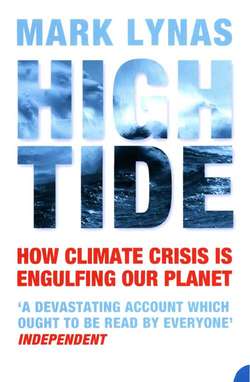Читать книгу High Tide: How Climate Crisis is Engulfing Our Planet - Mark Lynas - Страница 10
YORK, FEBRUARY 2002
ОглавлениеLess than a week after my trip to Monmouth – and over a year since the autumn 2000 floods – I was back in York. The Ouse had risen again – not on the same disastrous scale, but enough to wash over the towpaths, flood into the riverside car parks and surround the trees and parkland on either side.
I walked down from the railway station and onto the main road bridge, peering over once more at the swirling brown water beneath. On the far side was a sign advertising boat trips, and so I headed down the steep stone steps.
At the entrance to the boatyard was a chalked sign announcing: ‘Closed due to flooding’. The water was lapping at the edge of the yard so I skirted around the inside, to where the owner, John Howard, was sitting on a wooden bench staring at the river, absent-mindedly stroking a large ginger cat. Behind him workmen in blue overalls teetered across a makeshift jetty onto one of the out-of-service big boats, which was moored securely to two trees.
He waved me across to the bench. I stroked the cat, which started to purr loudly, and asked Mr Howard how the floods had affected him.
‘I lost all my income for November 2000. We basically had to shut down. We had about a foot of water in the house…’ (he indicated behind me to a neat cottage attached to a two-storey office) ‘…and if it happens more regularly we’ll have to consider raising the floors. But flooding is part of the business – we just have to work around it.’
I asked if he knew of other river experts I might be able to talk to, and he disappeared inside the office, reappearing with a handwritten telephone number for Laurie Dews, an old-time bargeman. ‘Now, Mr Dews, there’s nothing he doesn’t know about the river.’
I phoned him up straightaway.
‘Oh yes, I think the floods have got much worse these days,’ he said in a gravelly Yorkshire accent. ‘There’s all this heavy rain comes straight down off the hills. That’s a big change.’
I asked whether he’d be available to talk that afternoon. He paused. ‘Hold on. I’ll just check with the wife.’
Mrs Dews had just got back from her daily walk when I arrived in Selby an hour later. She seemed a little frail, but her husband was still sturdy, with strong features and a lively face.
‘Now what was it you wanted to know?’ he asked after we were installed in two living-room armchairs with tea and biscuits. I admired a framed golden wedding photograph, dated 1996. Now seventy-nine, Mr Dews had been retired for over ten years. His whole family had been bargemen, he told me, and he could trace the line right back to his own great-grandfather. They all worked barges up and down the Humber and Ouse rivers, loading the boats with oilseeds at Hull and hauling the cargo up to the cattle-feed mills at Selby. ‘We always respected the water,’ he recalled. ‘We didn’t do anything silly on it.’
He sighed. The barges are all gone now though, he told me. Some had been sold off for houseboats, others had moved elsewhere or been scrapped. Most of the feedstuff transportation now went by road in huge lorries.
It didn’t take long for us to get onto the weather. ‘There’s more flooding now than there used to be,’ Mr Dews told me. ‘Now you’re getting more rain and wind for sure. In my opinion there definitely seems to be more rain now.’
‘And less snow,’ added Mrs Dews from the sofa.
‘Yes, there used to be more snow, but you don’t get snow any more. You don’t get frost much either.’
Laurie Dews could remember the Great Flood of 1947, whose effects had been worse than the recent event – but only because in November 2000 army Chinook helicopters had been employed round the clock to ferry sandbags to vulnerable points around the town. ‘That saved a lot of Selby.’
He had got to know almost every aspect of the river in his long career: its shallow and deep areas, and how tides could have an effect on flooding. That’s where global warming also came in. ‘If seas and oceans are higher, your rivers aren’t going to go out as well. Global warming has an effect there. It’s got to have, hasn’t it?’
‘We’re all doomed!’ Mrs Dews interjected again from the sofa, giving me a wink.
‘Global warming is bothering everybody now – but what can you do?’ Mr Dews went on. ‘With the floods, storms and sea level rise everyone’s getting more concerned.’
Mrs Dews smiled over at us both. Outside the rain had begun again, and I was in no particular hurry to leave.
‘How about another cup of tea?’ she asked.
